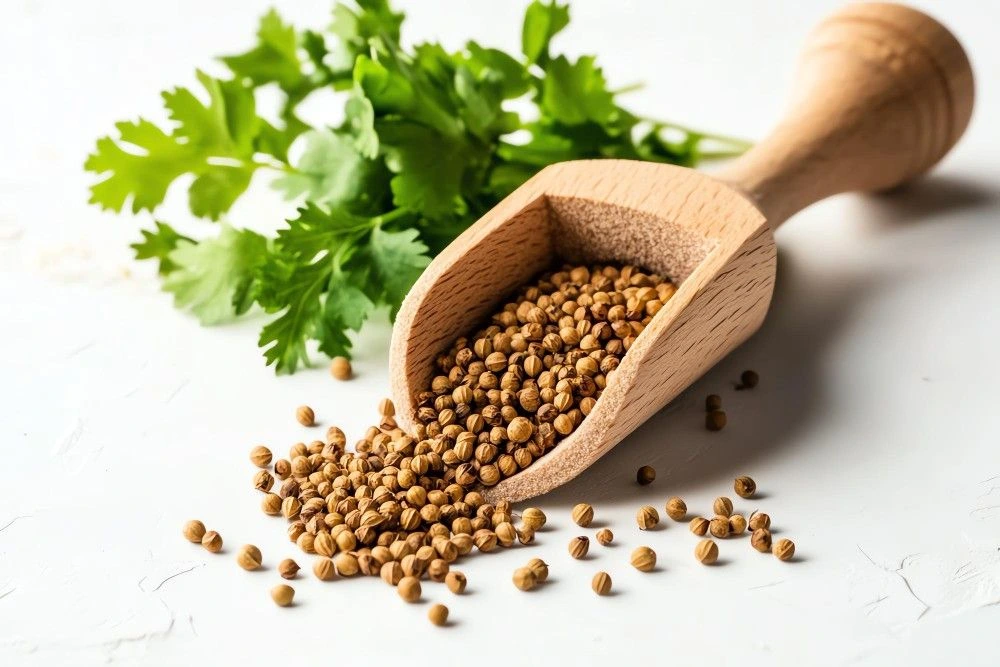Table of Contents
The kitchen was alive with laughter and the crackle of roasting spices. A grandmother stood by the iron skillet, gently stirring a handful of coriander seeds. As they began to pop and release their warm, citrusy aroma, the fragrance drifted through the house, drawing children and adults alike toward the heart of the home. For many Indian families, this simple act—roasting coriander for a spice blend—is more than cooking. It is a ritual of memory, heritage, and flavor.
Region & Origin
Coriander (Coriandrum sativum) is native to the Mediterranean and Middle Eastern regions, where it has been cultivated for thousands of years. Seeds dating back to 5,000 BC were discovered in ancient Egyptian tombs, while historical texts from Greece and Rome record its use in food, medicine, and even perfumes. From these early roots, coriander spread across Asia, eventually becoming an inseparable part of Indian cuisine and Ayurveda. Today, it is grown and cherished worldwide, from Morocco to Mexico, with India standing as one of its largest producers and exporters.
A Journey Through Time
Coriander, known as dhania in India, is one of the world’s oldest spices. Archaeologists discovered its seeds tucked inside Egyptian tombs, believed to accompany souls into the afterlife. The Greeks and Romans valued coriander not just for seasoning but for perfumes and medicinal concoctions. From the Mediterranean shores, coriander traveled eastward, becoming an inseparable part of Indian kitchens and healing traditions.
🌿 Coriander in Ayurveda
In Ayurveda, coriander (dhanyaka) holds a place of honor as a tridoshic herb—meaning it can balance all three doshas (Vata, Pitta, Kapha) when used appropriately. It is considered madhura (sweet) and kashaya (astringent) in taste, with a cooling energy that soothes excess heat in the body.
- Digestive Health: Coriander seeds are often brewed into teas or added to meals to reduce bloating, improve appetite, and calm acidity.
- Detox & Cooling: Ayurvedic practitioners recommend coriander water in summer to prevent heat-related imbalances and promote natural detoxification.
- Women’s Health: Coriander is believed to ease menstrual discomfort and support hormonal balance.
- Mind & Spirit: Its gentle, cooling nature is said to calm the mind, reduce restlessness, and promote clarity.
From an Ayurvedic perspective, coriander is more than a spice—it is a natural healer, gently supporting balance and wellness in everyday life.
Types of Coriander
Coriander comes in several varieties, each with unique characteristics and uses:
- Indian Coriander Seeds: Smaller, round seeds with a strong, robust flavor. Commonly used in curries, pickles, and masalas.
- European/Mediterranean Coriander: Larger seeds with a milder, slightly citrusy aroma. Often used in bread, sausages, and light sauces.
- Vietnamese Coriander (Rau Ram): Known for its fresh, pungent leaves rather than seeds. Adds a zesty flavor to soups and salads.
- Mexican Coriander (Cilantro): Typically grown for its leaves; seeds are used in mole sauces and spice blends.
Regardless of type, all coriander seeds share their warm, citrusy fragrance and golden-brown hue, connecting kitchens and cultures across the globe.
Everyday Uses
Coriander’s versatility is unmatched:
- Whole seeds sizzle in hot oil, infusing curries, dals, and pickles.
- Ground coriander forms the backbone of spice blends like garam masala and is sprinkled into countless dishes for depth and aroma.
- Infusions made from crushed seeds calm the stomach and refresh the body.
- Traditional medicine still values coriander for regulating blood sugar, reducing bloating, and supporting immunity.
📊 Nutritional Value of Coriander Seeds (Per 100g)
| Nutrient | Amount |
|---|---|
| Energy | ~298 kcal |
| Carbohydrates | 54.99 g |
| Protein | 12.4 g |
| Total Fat | 17.8 g |
| Dietary Fiber | 41.9 g |
| Sugars | 0 g |
| Calcium | 709 mg |
| Iron | 16.3 mg |
| Magnesium | 330 mg |
| Phosphorus | 409 mg |
| Potassium | 1,268 mg |
| Sodium | 35 mg |
| Zinc | 4.7 mg |
| Vitamin C | 21 mg |
| Vitamin A | 0 µg |
| Vitamin K | 135 µg |
(Values are approximate and can vary slightly depending on source and seed variety.)
A Note of Balance
While its healing powers are celebrated, moderation is key. Excessive use can sometimes cause digestive discomfort, reminding us that nature’s gifts are best enjoyed with care and respect.
More Than Just a Spice
Coriander seeds (dhania) are more than just a spice—they are a bridge between flavor, health, and tradition. As freshly roasted seeds are blended into masalas or brewed into teas, their warm, citrusy aroma fills kitchens, reminding us of centuries of culinary and healing wisdom. Native to the Mediterranean and Middle East, coriander is widely used in Indian cuisine and Ayurvedic medicine, where it aids digestion, detoxifies the body, and promotes overall wellness. With varieties ranging from robust Indian seeds to milder Mediterranean and Mexican types, these golden-brown seeds continue to bring aroma, taste, and a rich legacy of culture and health to every meal.

